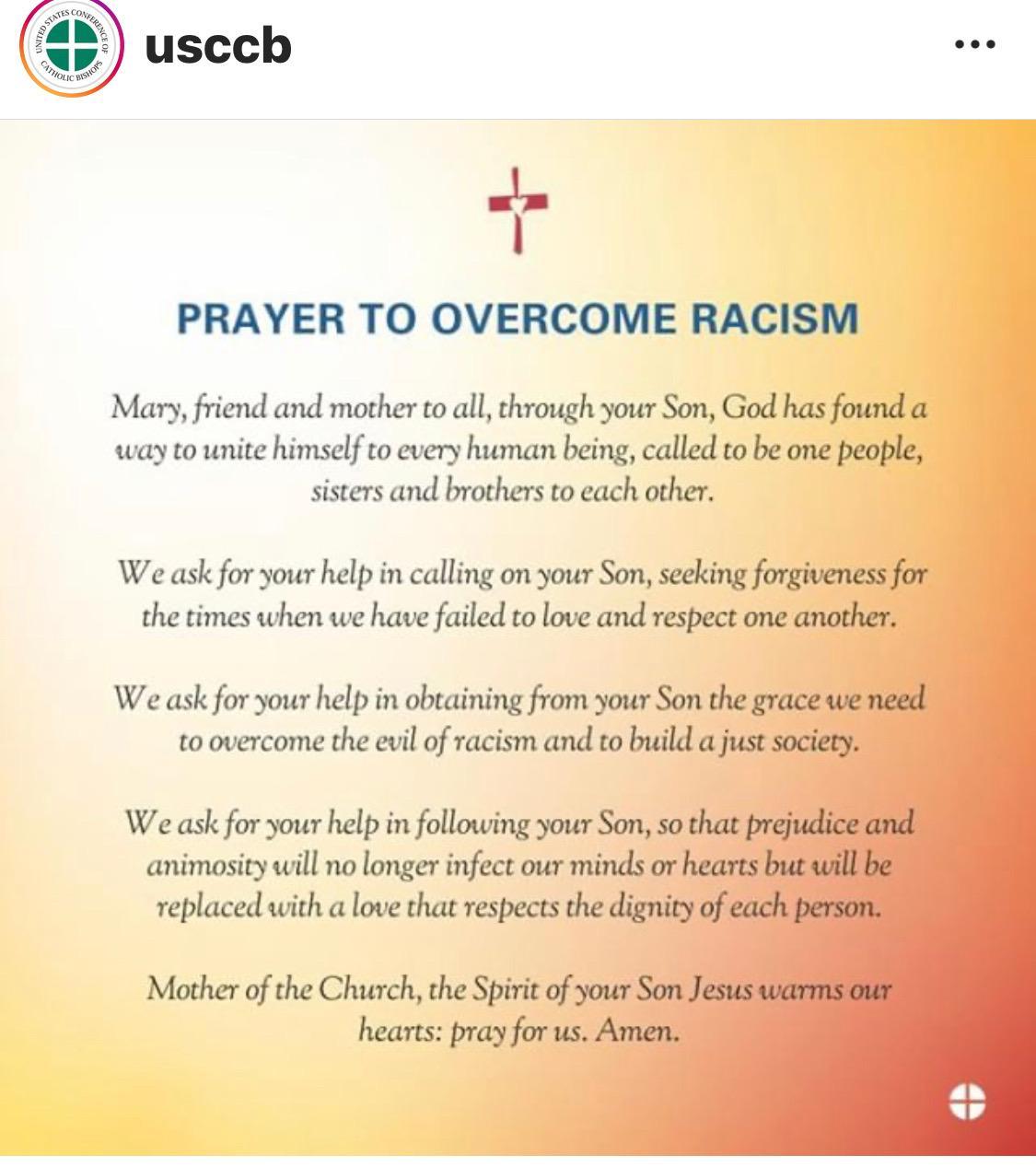Catholics against Racism
- Moving Beyond Victimization and Privilege, the Anti-Racism Challenge by OLA Parishioner Cathy Crayton is accessible through Pax Christi of Southern California at https://www.paxchristisocal.org/training/
- Message from Archbishop Jose Gomez (Angelus News)
- Response to death of George Floyd by the U.S. Conference of Catholic Bishops (USCCB.org)
- U.S. Bishops document, Open Wide Our Hearts, against racism (USCCB.org)
- California Conference of Catholic Bishops launch year-long anti-racism initiative. (Angelus, Sept. 2020)
- A Brief history about the Catholic Church's fight against racism. (Angelus)
-
Stations of the Cross as a reflection on the sin of racism:
Video in English: https://www.youtube-
nocookie.com/embed/RYc9_ QIRgr4?cc_lang_pref=en&cc_ load_policy=1 Video with Spanish subtitles: https://www.
youtube-nocookie.com/embed/ RYc9_QIRgr4?cc_lang_pref=es- MX&cc_load_policy=1 Video with Vietnamese subtitles: https://www.
youtube-nocookie.com/embed/ RYc9_QIRgr4?cc_lang_pref=vi& cc_load_policy=1 Stations of the Cross guide: https://www.cacatholic.
org/sites/default/files/ stations-of-the-cross- overcoming-racism.pdf - More resources: Anti-Racism Reading List from JustFaith
Racism: A Discussion Guide
The following was sent to parents of teens in our youth ministry programs. We share it here with all parishioners as a good guide for discussion at home, and among friends, as we grapple with recent events.
Over the past couple of weeks, we have been reflecting upon and discussing several difficult realities facing our world today. First, the realities that have arisen from Covid-19 such as mental health concerns, missed graduations, job losses, or maybe even the loss of a loved one. This past week we also witnessed different parts of our country take to the streets for peaceful protesting in order to combat racism. Unfortunately, we also witnessed looting, rioting, and other acts of violence. So how do we talk about this difficult topic as a family?
Many people, even those of us who serve in the Church, avoid talking about race and racism. Emotions almost always run high in these conversations, which generally makes us uncomfortable.These conversations also demand skills that most of us are not used to employing on a regular basis, so they seem intimidating. Many of us are afraid that we might misspeak, unintentionally appear to be racist, or do more harm than good so we err on the side of caution, which leads us to largely remain silent. However, as difficult as having these types of conversations may be it’s important we have them.
Below are some Guidelines and Conversation Starters that will hopefully help you to begin to have the conversation with teens and children. [It is a good guide for adults conversations, as well.] As you move forward, be honest about your vulnerabilities, own your strengths, and commit to addressing your needs as you get ready for these conversations with your
family or friends.
Praying for you,
OLA Coordinator of Youth Ministry
Guidelines for Discussion
BEGIN IN PRAYER: Prayer reminds us that we are all brothers and sisters in Christ who equally need God’s grace to become whole and holy. Prayer unites us, softens our hearts, and allows space for God’s will to be done.
USE “I FEEL...” AND “MY EXPERIENCE IS…” STATEMENTS: It is important that comments stay rooted in “I” statements, instead of speaking for other individuals or groups of people. Speak only from your unique point of view and lived experience. For example, “Based on what ___ said, I think…”
LISTEN TO UNDERSTAND AND SPEAK CHARITABLY: A good practice in any kind of dialogue is to listen for understanding, rather than listening for the sake of crafting your response. When speaking, avoid talking over or interrupting others, and always treat others in a way that is loving and respectful.
RESPECT THE EXPERIENCES OF OTHERS: As people share their stories and perspectives around the topic of race, recognize that it is not our job to judge their experiences. Instead, respect their stories and offer a safe space for them to share by listening with compassion.
ALWAYS ASSUME GOOD INTENTIONS: Because of the variety of experiences in this discussion, it is important that we set the tone for our discussion as one of humility. We are all here to learn, but we can also teach one another. As we share, it is important to approach every person as if they are speaking with no malice.
Conversation Starters
- What have you witnessed or heard that has affected you the most?
- Moving forward, is there anything we can do, as a family, to constantly make room for others in our lives?
- Do you think there is a need in our society to “hit the reset button” on how we approach racial injustice in
our world today? Why or why not?

